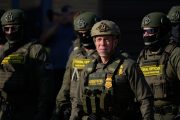
The jury in the case trial of Kyle Rittenhouse, who is charged with shooting and killing two hardened criminals and shooting and wounding a third during last year’s Blake riots, did not return a verdict after a full day of deliberations.
But even if it does the unthinkable and finds Rittenhouse guilty, the then-17-year-old who defended himself from the three thugs might not go to jail.
On Monday, when jurors heard closing arguments, defense attorneys filed a motion for mistrial with prejudice that accuses prosecutors of misconduct on three grounds.
- Prosecutors twice asked Rittenhouse on the stand about his post-arrest silence;
- Prosecutors ignored a court order not to pursue a certain line of questioning; and
- Prosecutors failed to give the defense drone video of the same quality it used.
The motion also accuses prosecutors of “overreach,” and suggests they acted intentionally to provoke a mistrial because their case was failing. Then they could retry Rittenhouse.
Judge Bruce Schroeder has not ruled on the motion and won’t if the jury acquits. He will if the jury convicts. If Schroeder grants the defense motion, prosecutors cannot retry Rittenhouse.
You Have the Right
The seven-page motion begins by recounting Prosecutor Thomas Binger’s asking why Rittenhouse had been silent since the shootings. “Since August 25, this is the first time you told this story,” he said.
The remark drew an objection from Rittenhouse’s attorney, Mark Richards, which Schroeder sustained. But Binger asked the question again, and Schroeder ordered the jury to leave the room, whereupon he admonished the prosecutor.
But Binger persisted, the motion avers:
Then after being warmed about post-arrest silence, the state violated the court’s order regarding the admission of “other acts of evidence” by asking the defendant, “you have previously indicated that you wish you had your AR15 to protect someone’s property.” The court again admonished the state for violation of the previous court order.
That question inspired Schoeder’s viral “don’t get brazen with me” tirade, during which he said Binger had already almost crossed the line when he brought up Rittenhouse’s post-arrest silence.
The third issue, again, is the low-quality video the defense received half-way through the 10 days of testimony.
“The prosecution turned over to the defense footage of a drone video which captured some of the incident from August 25, 2020,” the motion says:
The problem is, the prosecution gave the defense a compressed version of the video. What that means is the video provided to the defense was not as clear as the video kept by the state.
Motion for Mistrial
The rest of the motion explains why Schroeder must declare a mistrial. The motion accuses prosecutors of “overreach,” and avers that Binger’s conduct was clearly intentional.
“The prosecutor’s conduct was clearly intentional. Initially, he asked the defendant about post arrest silence and that objection was sustained,” the motion says:
He then did it again, moments later. Further, prior to the defendant taking the stand, the Court not only foreclosed the introduction of “other acts of evidence,” the Court stated “unless there is something else on that” and the state said nothing. Shortly thereafter, they violated the court ruling. That behavior by the state was an intentional act and he knew it would be prejudicial to the defendant, he had previously attempted to get the evidence admitted….
The record has bad faith on the part of the prosecutor. We know that because he attempted to inform the court of his good faith basis for asking questions regarding the inadmissible evidence, and was told “I don’t believe you.”
If it is not a good faith basis for seeking the admission previously excluded evidence, then it is bad faith. The court has made the statement that it does not believe the prosecutor’s statement. It is reasonable to conclude the court believes bad faith was involved.
Testimony from the prosecution’s own witnesses were destroying its case, and so Binger, the motion strongly suggests, tried to provoke a mistrial to get a second shot at Rittenhouse.
What Happens Next
Citing legal experts, the Milwaukee Journal Sentinel reported that Schroeder needn’t rule on the motion if the jury returns not guilty verdicts, but must if the jury convicts on just one count:
“I’m not sure why the judge has waited to rule,” said Michael O’Hear, professor of criminal law at Marquette Law School, in an email. “It seems unlikely to me that he would have turned the case over to the jury if he expected to grant the mistrial.”
Keith Findley, a professor at the University of Wisconsin Law School, called the lack of decision “odd.”
“The only reason I can think of for waiting is perhaps he wants to give the jury a chance to acquit so he doesn’t have to, but that’s speculation on my part,” Findley, co-founder of the Wisconsin Innocence Project, said in an interview.
O’Hear told the newspaper he didn’t believe the judge would let the “jury go to that effort if it was all going to be in vain.”




